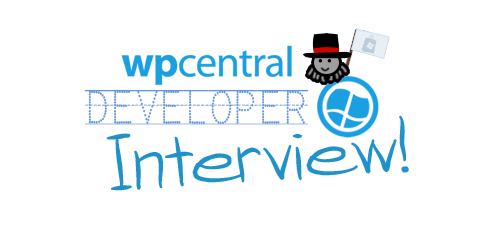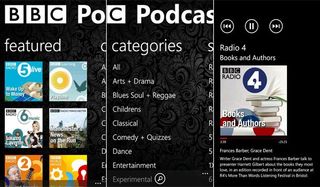Developer Interview: Richard Castle from Igneous Software

This week we've had the pleasure in being joined by Richard Castle of Igneous Software, the brains behind the BBC Radio apps and upcoming BBC Podcast Lounge. As well as a solution for BBC radio streaming, the Podcast Lounge offers Windows Phone users Metro-influenced access to the BBC catalogue of programs. Castle walks us through his background in software development and how he started up the covered projects.
Head on past the break for the full interview.
Tell us about yourself and how you got into software development.
I live in Twickenham, London with my beautiful wife Dawn and daughter Matilda. The neighbours joke that we’re a bit like Tom and Barbara in the UK sitcom "The Good Life" with our chickens in our garden and allotment nearby! I'm a Program Manager by day for an big American avionics company. Lots of bids to generate, projects to manage and teams of Engineers to co-ordinate.
My background is in Mechanical Engineering, but I spend more time on Electrical and Software Engineering these days. Unfortunately the day job doesn't give me much opportunity to be an Engineer anymore, so in the evenings I run Igneous Software where I really enjoy creating apps. I've never been formally trained, but self-taught myself starting with OS/2 REXX then Turbo Pascal, Delphi and most recently C#.
What do you think of Microsoft's platform (from a user perspective) and how do you compare it to competitors?
I think it's wonderful. It's a bold attempt to do something very different in the smartphone space. As a Project Manager I have enormous respect at the pace the team at Microsoft worked to start Windows Phone from scratch. In my eyes, they achieved the impossible. It’s not been without problems, but Microsoft has demonstrated they do listen to their customers and I think Mango is just a taster of what’s ahead.
Get the Windows Central Newsletter
All the latest news, reviews, and guides for Windows and Xbox diehards.
Compared to its competitors, I think Windows Phone performs admirably. Both Android and iPhone have had a significant head start, so the new upstart will always have a challenge to get a share of the customer voice. Android had the same bumpy year when it started.
What path(s) led you to develop for Windows Phone?
I wanted to get into app development for a while. I saw a video of Joe Belfiore presenting an early version of Windows Phone at MWC and I was immediately impressed with where they were going. I was confident that Microsoft would have great tools and I was keen to learn C#. I remember my marketing lecturer telling me that it was always better to be a big fish in a small pond, rather than a small fish in a big pond; that’s pretty much why I got into developing for Windows Phone! So far, it's worked!
What's your take on the Windows Phone development process?
I really like it. I'm still learning and as my understanding grows, I find better and more elegant ways to do things. I'm blown away by the simplicity of binding data to controls and I really like the way code and UX can be handled independently to some degree. I love the excitement of putting an update onto the Marketplace and the trepidation of first-customer feedback.
Have you developed for other platforms and if so how does the development process compare?
Not really unfortunately. Maybe I'm biased, but from what I've seen I'm pretty happy that I'm only developing for Windows Phone!
As a developer, what's one change you'd like Microsoft to implement on the platform?
Good question. I'd really like them to find a way to relax the restrictions on getting data to and from the device. I'm not in favour of the wild-west Android approach, but perhaps allowing a tethered phone to appear as a storage device giving access to the documents, music and pictures area on the phone etc. I'm also keen to see a Bluetooth SDK as I can think of some fun projects with a little more control.
You've got a number of successful BBC Radio apps under your belt, all boasting an almost perfect rating. What's your secret?
Couple of things. Attention to detail in the design, even with the minimalist Metro styling is key. It's a matter of trying to get the job done without overdoing it. I take great inspiration from the in-built apps. I think Microsoft have struck a great balance between simplicity and capability. I have tried to adopt that in what we do.
The second it pretty obvious. Stay close to your customers. Apologise when they find a bug, help them with a work-around and let them know when the update is available. In most cases, even if they've been disappointed, making contact often makes a big difference. They are constantly suggesting new ideas, so crowd sourcing is in full effect.

Tell us how upcoming BBC Podcast Lounge came about, and what problems did you encounter through development?
This was one feature that was requested more than any other. Users loved having the live shows on the BBC Radio Player, but didn't get the opportunity to catch programs they may have missed. I toyed with the idea of combining the features, but was concerned that it would be too confusing for users. I developed some proof of concept using the BBC's Backstage API website (now closed down unfortunately) and then built the app to a set feature set. Fortunately I was able to share much of my common functions from the BBC Radio Player which helped accelerate development.
Fortunately I haven't encounter many problems. I discovered an odd encoding bug with the BBC data to do with code pages being wrong. They were appreciative when I fed back to them and they are making fixes at their end. The development time-line has certainly been faster for an arguably more complicated app.
What other Windows Phone projects are you working on that we could look forward to in the future?
I've got a couple of proof of concepts in the works right now, although main focus is on the BBC Podcast Lounge. I'd really like to do something with the National Trust here in the UK. They are pretty amazing and I'd really like to bring some of their content to Windows Phone. I only wish they'd return my calls :o).
What advice would you give to other aspiring developers from your experience?
Don’t get stuck in the incremental development loop where you delay release because you want to add that next killer feature in. Stick to your plan and release regular updates; they will help keep your app prominent in your users' minds. Get in touch with the local developer groups as they are a great place to meet like-minded people (and enjoy free beer from Microsoft!).
Thank you for your time. Any closing words about WP7's future?
I'm frankly really excited. I'm seeing the Nokia effect with my apps on the Marketplace and if the rumours about Apollo are true, then I think Windows Phone has an excellent future ahead of it. I've bet my company on it and so far I have no regrets.
There you have it folks, be sure to check out the Igneous Software website.

Rich Edmonds was formerly a Senior Editor of PC hardware at Windows Central, covering everything related to PC components and NAS. He's been involved in technology for more than a decade and knows a thing or two about the magic inside a PC chassis. You can follow him on Twitter at @RichEdmonds.